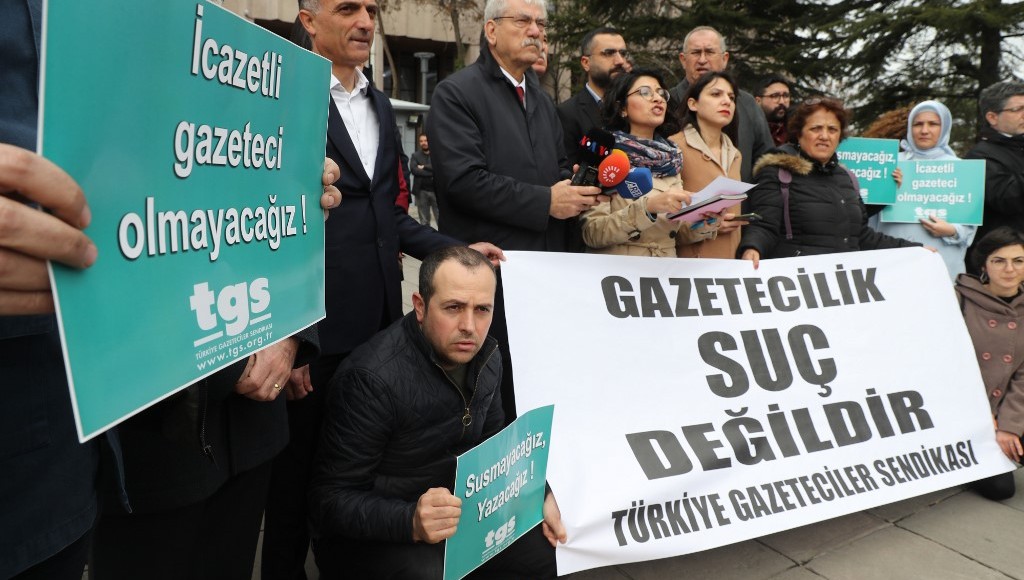A report by Turkey’s main opposition Republican People’s Party (CHP) points out a series of unlawful practices in 2020 that violated citizens’ rights to a fair trial and freedom of speech and assembly, among others, while the coronavirus pandemic was devastating the country, the Cumhuriyet daily reported on Thursday.
The report, titled “An Inventory of Injustice,” was drafted by Muharrem Erkek, CHP deputy chairperson and lawmaker from the northwestern province of Çanakkale, laid bare the increasing government-led pressure on dissident journalists and media outlets, a crackdown on civil society, the violation of CHP members’ rights and an ever-increasing number of femicides in Turkey.
Advertising bans imposed by Turkey’s Press Advertising Agency (BİK) on the Cumhuriyet, Sözcü, Birgün, Korkusuz and Evrensel newspapers due to their reporting critical of the Justice and Development Party (AKP) government led to financial difficulties during the pandemic and could be equated to an order not to report the truth, Erkek said in the report.
The vice chair added that Turkey’s broadcasting watchdog, the Radio and Television Supreme Council (RTÜK), imposed TL 10 million ($1.3 million) in fines on TV stations critical of President Recep Tayyip Erdoğan and his AKP, 25 times the amount of fines it imposed on pro-government TV stations in 2020.
“The ruling party continued to see [independent] journalism as a crime in 2020. A number of journalists, including columnists from Sözcü and Cumhuriyet, were accused of political and military espionage. Some were seen as spies, terrorists and traitors and unlawfully put behind bars only because of their reports and [understanding of] journalism,” Erkek said.
According to the report dozens of citizens stood trial for allegedly insulting President Erdoğan in 2020.
Erkek reminded that CHP İstanbul provincial executive Canan Kaftancıoğlu, who received nine years in prison for allegedly insulting Erdoğan and spreading terrorist propaganda in 2019, is currently facing a jail sentence of up to 10-and-a-half years on separate charges.
He underlined that lower court defiance of higher courts was a commonplace occurrence in Turkey in 2020, with an İstanbul high criminal court defying a Constitutional Court order saying that the rights of CHP deputy Enis Berberoğlu, who was ousted from parliament after the country’s top appeals court upheld his conviction on disclosing government secrets, had been violated.
“Not a single member of the CHP will back down from the struggle for democracy in Turkey. If there’s a price to pay, we’ll pay it,” the vice chair said.
Erkek went on to say that Turkey’s parliament in 2020 passed two controversial laws that render bar associations dysfunctional and allow further government encroachment on civil society organizations.
The first law allows multiple bar associations to be formed in each province in place of the current system in which each province has a single association, in the process diluting the bars’ power.
The second law authorizes the interior minister to shut down associations or remove their executives and replace them with government-appointed trustees and limit their solicitation of donations, thereby increasing the monitoring of associations and foundations as part of a possible further government crackdown on civil society.
The report further said femicides, which have been increasing since the AKP came to power in 2002, totaled at least 300 in 2020.
“Yes, we are up against a pandemic of injustice due to the populist, authoritarian regime that was established under the name of the executive presidential system,” Erkek emphasized in reference to Turkey’s switching from a parliamentary to an executive presidential system of governance, which granted Erdoğan sweeping powers and was criticized for removing constitutional checks and balances and thus further weakening democracy.

